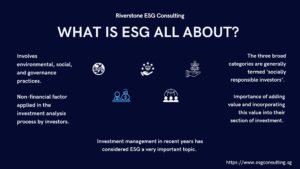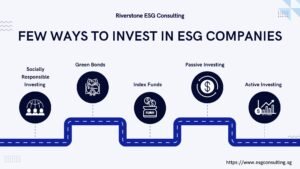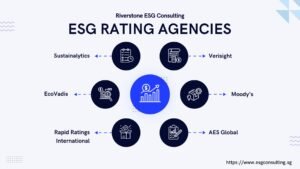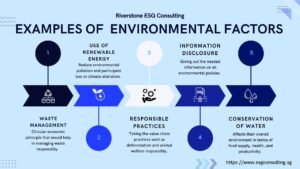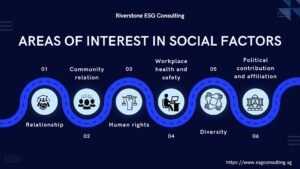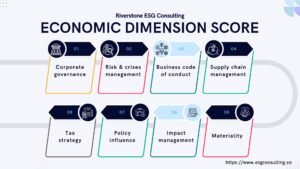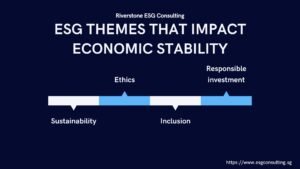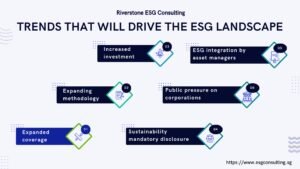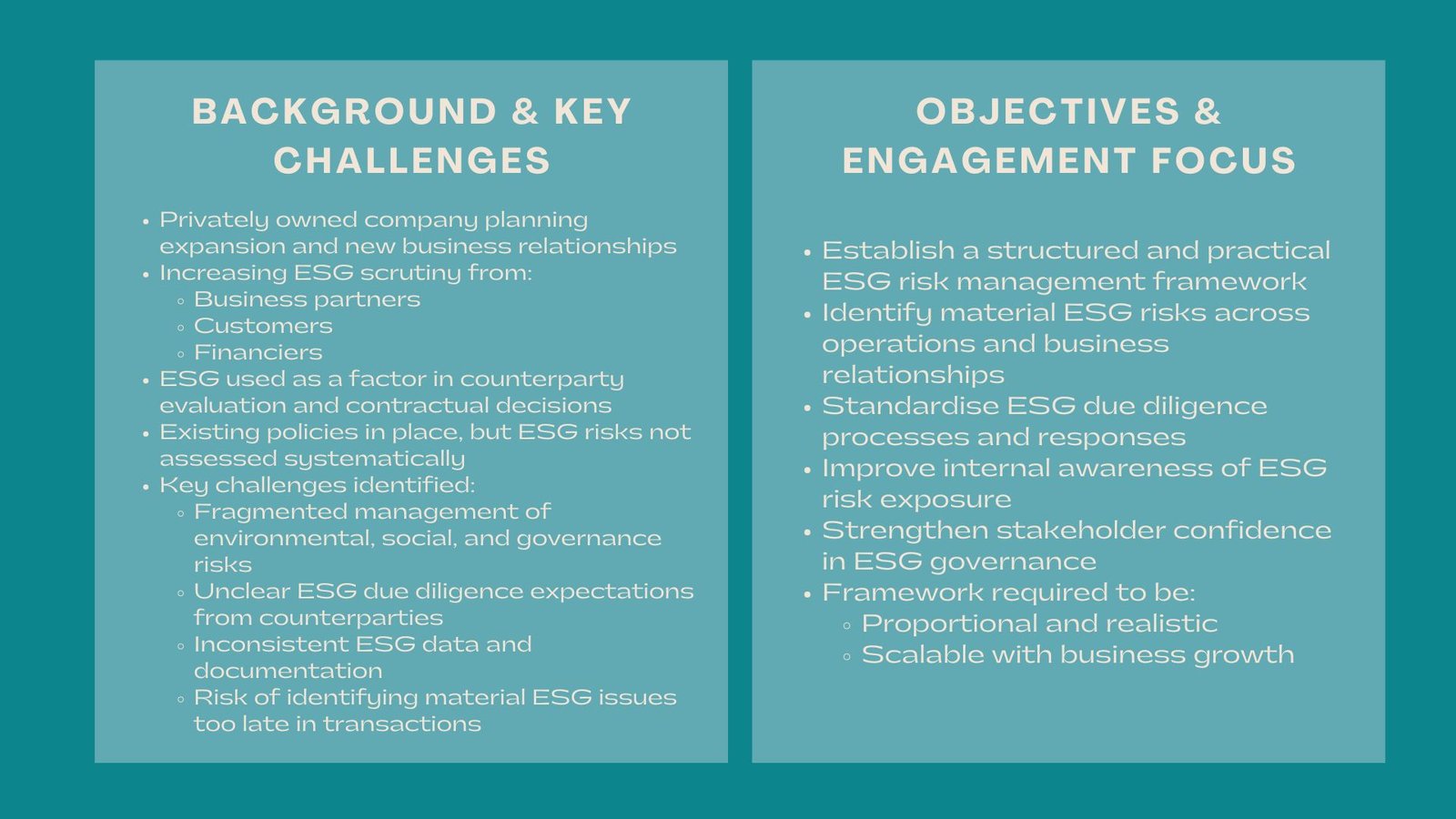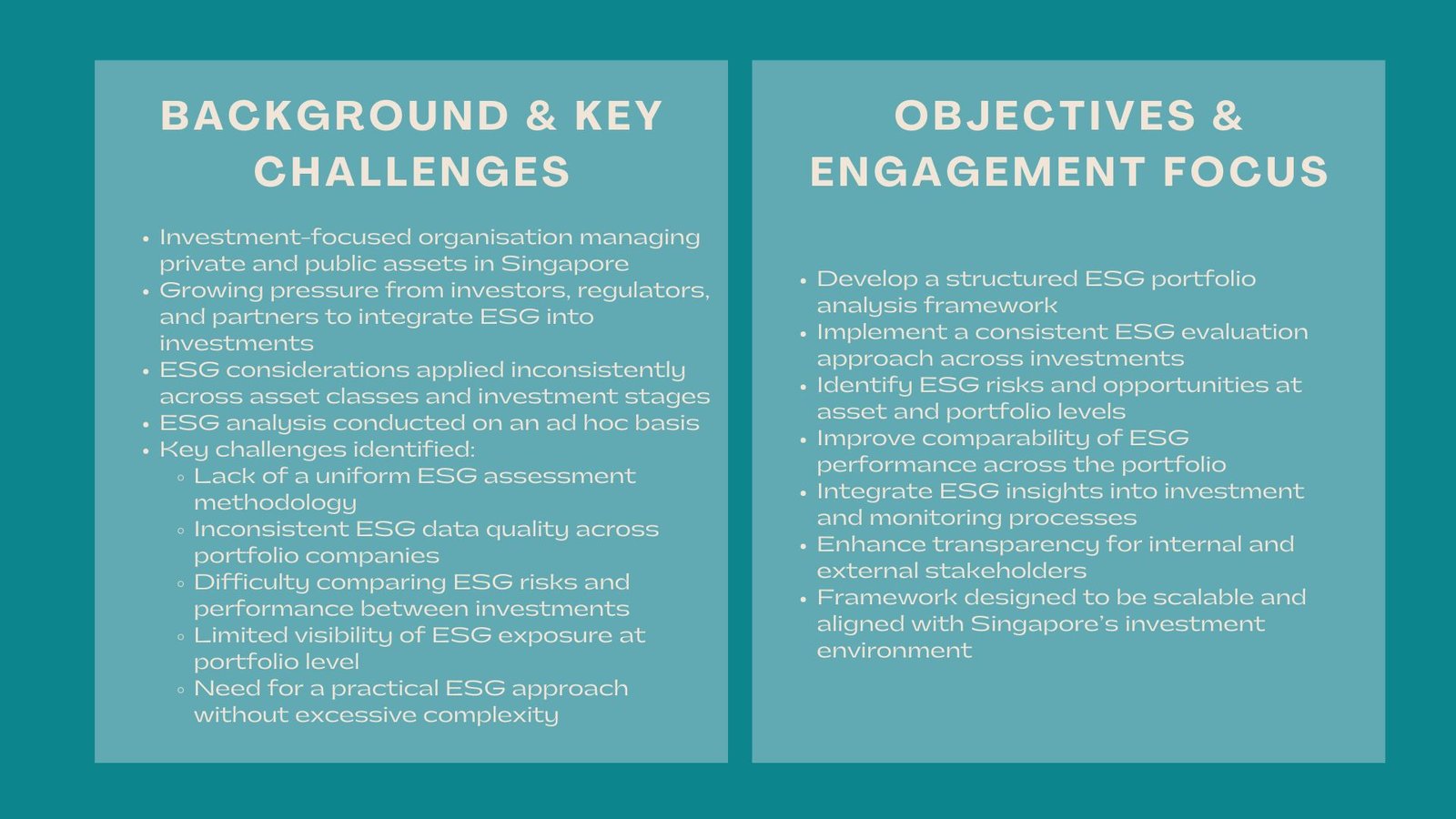How Riverstone ESG Consulting Helps Businesses Achieve Global ESG Standards (GRI, SASB, TCFD)
Introduction to ESG Consulting for Global Standards Compliance
In the modern globalized economy, sustainability is no longer an unnecessary issue, but a primary support of corporate success. Firms in both Singapore and Asia are under increasing scrutiny in terms of their fit to global Environmental, Social and Governance (ESG) criteria. Transparency and accountability are enforced by investors, regulators, and consumers, which makes it vital to make businesses follow internationally accepted practices, including the Global Reporting Initiative (GRI), the Sustainability Accounting Standards Board (SASB), and the Task Force on Climate-related Financial Disclosures (TCFD).
In most organizations, however, it is complicated to be in compliance with these frameworks. The requirements, reporting structure, and the expectations of the stakeholders of each standard are different. Riverstone ESG Consulting has emerged as a top choice of companies who need clarity and direction in this emerging environment. With customized solutions, practical solutions, and professional knowledge, the company makes sure that not only do companies achieve the global standards of ESG but also they are competitive in the future.
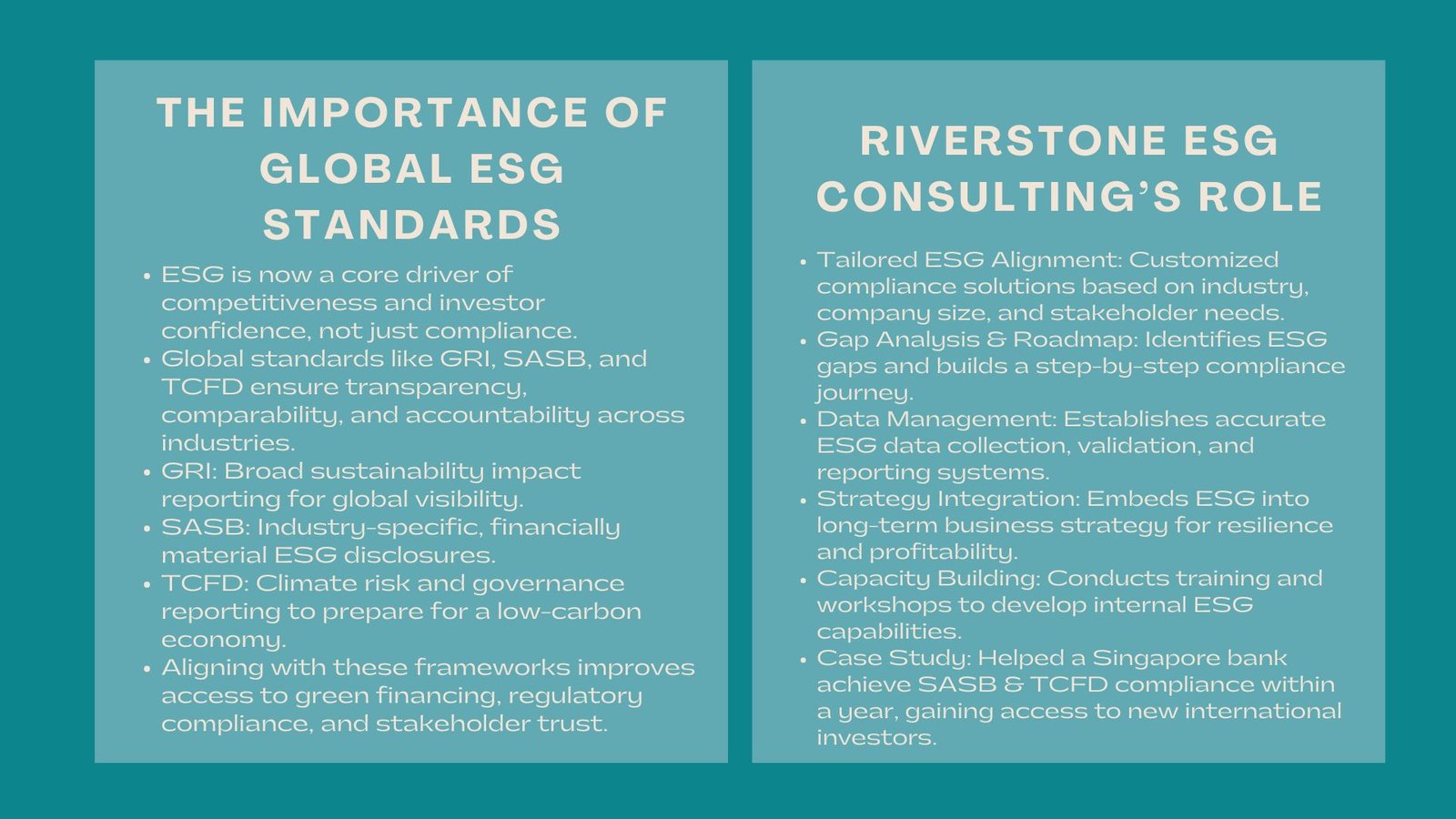
The awareness of Global ESG Standards.
GRI: A Global Reporting Initiative.
Global Reporting Initiative (GRI) is the most popular system of sustainability reporting. It helps organizations to report their environmental and social impacts in a standardized and comparable manner. The implementation of GRI helps companies to be transparent and accountable to a wider audience across the world.
SASB: Sector-Specific Materiality.
The SASB framework is contrasted to GRI because it dwells upon industry-specific metrics, which are financially material. As an example, a financial services company will report about governance, client trust, whereas a manufacturing company can focus on resource efficiency. This sector-based strategy will make sure that companies report the most important ESG concerns to investors.
TCFD: Risk Disclosure of Climate.
The TCFD framework deals with the financial risks relating to climate. It motivates the organizations to report the governance, strategy, risk management, and metrics of climate change. To investors and regulators, TCFD reports point out those companies, which are ready to transition towards a low-carbon economy.
The importance of Compliance to Businesses.
Confidence and Access to Capital by Investors.
Investors of the globe are allocating in a screening manner and ESG performance is being screened. In case of failure to report well, the companies will not be included in the investment portfolio. By using such frameworks like GRI, SASB, and TCFD, credibility to institutional investors and access to green financing is guaranteed.
Regulatory Alignment
Singapore Exchange (SGX) has also made available compulsory disclosures on sustainability in line with international best practice. Regulators in Asia are doing the same and integrating ESG into their compliance regime. Those companies that do not adapt can be fined or damaged as a result of their reputation.
Competitive Advantage
Leading businesses in the sphere of ESG reporting are in a better situation to ensure partnerships, customers, and contracts with multinational corporations that require high-quality ESG standards in their supply chains.
Riverstone ESG Consulting’s Role in Achieving Compliance
Tailored Framework Alignment
Riverstone provides expert ESG consulting services for GRI SASB and TCFD compliance in Singapore, guiding businesses through the unique requirements of each framework. Instead of a blanket solution, the firm is customizing its solution depending on industry, size of the company and priorities of the stakeholders.
Gap Analysis and Roadmap Development.
The first step is the analysis of the gaps. Riverstone compares the existing ESG practices with the GRI, SASB, and TCFD requirements. According to the results, the company works out a plan with very distinct steps to follow in order to become compliant.
Data Collection and Data validation.
Proper reporting on ESG requires quality data. Riverstone aids businesses to establish mechanisms to gather, investigate, and authentic ESG information throughout their activities. These are environmental performance indicators, governance systems, and climate-related risks.
Corporate Strategy Integration.
The capacity to incorporate ESG frameworks into the wider corporate strategies is one of the strengths of Riverstone. Rather than compliance being a ticking box affair, the company makes ESG reporting be supportive of the long-term business objectives and increases resilience.
Case Study: A Local Financial Institution.
One of the mid-sized financial institutions in Singapore was interested in enhancing its ESG reporting in order to appeal to international investors. The bank had difficulties in adapting to SASB and TCFD because of disconnected data and internal knowledge deficiency.
Riverstone performed a comprehensive materiality analysis, simplified data collection procedures, and created TCFD-conformant climate risks disclosures. The bank did not just attain compliance within a year, but it was also able to raise funds through investors around the world who had previously avoided it because of poor reporting.
The Value of Specialized ESG Advisory
Riverstone also provides specialized ESG advisory support to meet international reporting standards in Asia, helping businesses extend their ESG credibility beyond Singapore. A lot of Asian firms have difficulty in harmonizing disclosure in more than one jurisdiction. Riverstone fills this gap by implementing global structures in a manner that is locally acceptable in terms of regulatory and cultural environment.
As an illustration, a Malaysian manufacturing company might be required to follow the global supply chain reporting standards of GRI and still fulfil local standards of ESG disclosure. Riverstone guarantees smooth integration, and the burden of administration is decreased, and the global visibility is also enhanced.
Training and Capacity Building.
Riverstone has a distinction of devoting itself to capacity building. The company provides workshops and training courses to corporate leaders, compliance officers, and sustainability teams to enable them manage ESG reporting within the firm. This makes companies not reliant on consultants only but develops internal competencies towards long term success.
Strategic Benefits of ESG Compliance.
Resilience to New Types of Risks.
Frameworks such as TCFD equip companies with the risks of climate change, which include carbon bills, disruption of supply chains and the physical destruction of premises caused by extreme weather conditions. Early adopting of these standards by companies can make them more resilient to financial and operational shocks.
Greater Brand and Reputation.
Clear reporting of the ESG improves brand reputation. This can also be seen as a reputation that can distinguish a company among its competitors in a competitive market such as Singapore, thus being an ideal partner to customers and partners.
Sustainable Growth Opportunities.
Embracing global structures, businesses discover the avenues of efficiency, innovation and additional sources of revenue. As an example, discovery of processes that consume carbon can result in alternatives of energy sources that are renewable and less costly and environmentally responsible.
Ahead: ESG Standards in the Future 2025 and Beyond.
With the development of sustainability frameworks, the overlap of standards will probably take place. ISSB, among others, is also moving towards harmonisation of reporting under various frameworks or SASB and TCFD. Riverstone has not been left behind in these developments, and as such, it keeps its clients abreast with the present and future international standards.
This is to say that engagement with a progressive ESG consultant is no longer the choice but a strategic requirement of businesses in Singapore and Asia. Riverstone knowledge and experience coupled with understanding of the region and practicality make it the preferred partner to companies making attempts to align with international environmental, social, and governance procedures.
Conclusion
Business reporting and accountability is taking a new dimension as global ESG standards are being used to define the future of business reporting and accountability including GRI, SASB and TCFD standards. Businesses that adopt such frameworks are not only assured of compliance, but they are also at a competitive advantage to attract investors, foster stakeholder confidence as well as long-term resilience. Riverstone ESG Consulting is also strategically located to help businesses in Singapore and Asia through this difficult process, to turn the compliance issues into a chance of sustainable development, supported by the certified ESG course Singapore Riverstone experts program.

